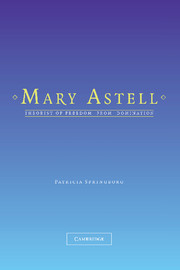Book contents
- Frontmatter
- Contents
- Acknowledgements
- Mary Astell, a Brief Chronology
- Introduction: Astell and Early Modern Feminism
- 1 Mary Astell, Philosopher, Theologian and Polemicist
- 2 Astell, Drake, Education, Epistemology and the Serious Proposal
- 3 Astell on Marriage, Patriarchalism and Contractarianism
- 4 Mary Astell and the Settlement of 1689
- 5 A Fair Way with the Dissenters and Their Patrons
- 6 Astell, Locke and the Highway Man: A Test Case
- 7 Astell, Drake and the Historical Legacy of Freedom
- Appendix: Glossary and Select Biographical Notes
- Notes
- Select Bibliography
- Index
1 - Mary Astell, Philosopher, Theologian and Polemicist
Published online by Cambridge University Press: 07 September 2009
- Frontmatter
- Contents
- Acknowledgements
- Mary Astell, a Brief Chronology
- Introduction: Astell and Early Modern Feminism
- 1 Mary Astell, Philosopher, Theologian and Polemicist
- 2 Astell, Drake, Education, Epistemology and the Serious Proposal
- 3 Astell on Marriage, Patriarchalism and Contractarianism
- 4 Mary Astell and the Settlement of 1689
- 5 A Fair Way with the Dissenters and Their Patrons
- 6 Astell, Locke and the Highway Man: A Test Case
- 7 Astell, Drake and the Historical Legacy of Freedom
- Appendix: Glossary and Select Biographical Notes
- Notes
- Select Bibliography
- Index
Summary
Astell's Life and Works
Mary Astell was born in a century in which Great Britain had experienced a civil war, a regicide, the (successful) attempt to exclude an heir to the throne on religious grounds, a constitutional revolution and two changes of dynasty. By her day it was already a landscape politically divided between the Whigs, generally pro-Parliament and pro-religious toleration, and the Tories, generally pro-king and anti-religious toleration, respectively. It was a century that saw the passing of a Bill of Rights, a Toleration Act and the consolidation of a constitutional monarchy that recognized specified civil rights in a path-breaking way. The Bill of Rights Act of 1689, together with the Toleration Act of the same year, promoting limited religious toleration, and the Triennial Act of 1694, which ensured regular elections and prevented the king from dissolving Parliament at will, represented major constitutional reforms that were the enduring achievement of the Glorious Revolution of 1688. These developments took place in an environment of strong politicking, personal intrigue, pamphlet warfare and an ideological climate that embraced a relatively wide spectrum of society. It was an environment in which, like the Restoration, women writers were to find a niche as novelists, dramatists and, in Astell's case, political pamphleteers. The seventeenth century had seen the flourishing of important philosophical schools that also claimed female adherents, both in England and on the Continent.
- Type
- Chapter
- Information
- Mary AstellTheorist of Freedom from Domination, pp. 27 - 80Publisher: Cambridge University PressPrint publication year: 2005



